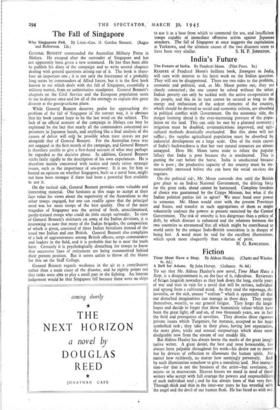India's Future
The Future of India. By Penderel Moon. (Pilot Press. 5s.)
READERS of Penderel Moon's brilliant book, Strangers in India, will turn with interest to his latest work on the Indian question.
They will not be disappointed. There are two sides to the problem, economic and political, and, as Mr. Moon points out, they are closely connected ; the one cannot be solved without the other.
Indian poverty can only be tackled with the active co-operation of the people, and this in its turn cannot be secured as long as the energy and enthusiasm of the ardent elements of the country, which should be devoted to social and economic reform, are absorbed in political conflict with Government. On the economic side, the danger looming ahead is the ever-increasing Pressure of the popu- lation on the land. This can only be met by a planned economy ; irrigation must be doubled, communications improved, and agri- cultural methods drastically overhauled. But this alone will not suffice ; the surplus agricultural population must be absorbed by industrial development on a large scale. One of the main causes of India's backwardness is that her vast natural resources are almost untapped. Here Mr. Moon turns aside to refute the popular fallacy that India is poor because she is uneducated. This is putting the cart before the horse. India is uneducated because she is poor ; the productive capacity of the country must be im- measurably increased before she can have the social services she requises.
On,the sidl, Mr. Moon contends that until the British give place to an Indian National Government, the driving force for the great tasks ahead cannot be harnessed: Complete freedom of choice was guaranteed by the' Cripps Mission; but what if the Indian political parlies fail to agree? We must hand over power to someone. Mr: Moon would start with the present Provinces and States, and transfer to such aggregations of them as might voluntarily coalesce the poWers at present exercised by- the Central Government. The risk of anarchy is less dangerous than a policy. of drift, by which distrust is enhanced and the relations between the two countries so envenomed-that all which might be contributed to world unity by the unique Indo-British association is in danger of being lost. A word must be said for the excellent illustrations, which speak more eloquently than volumes of print.
H. G. RAWLINSON. .






















 Previous page
Previous page